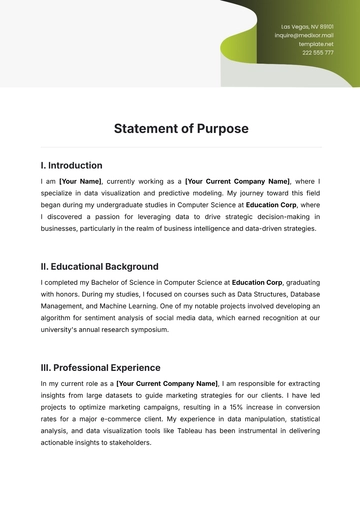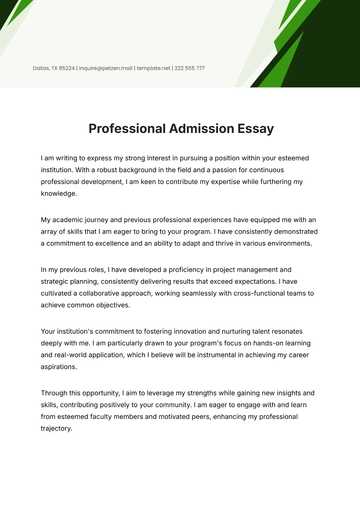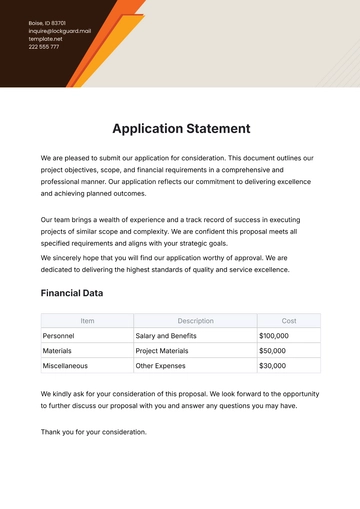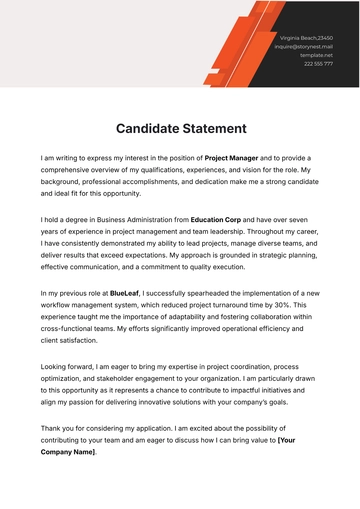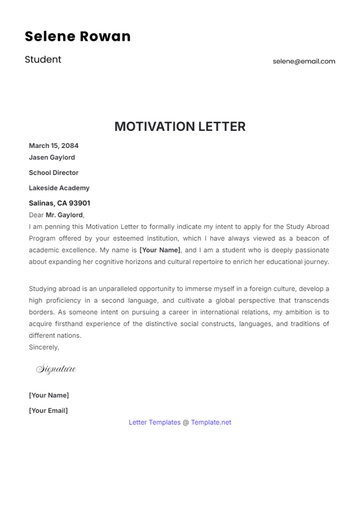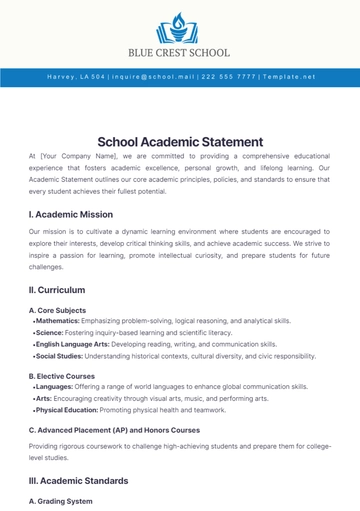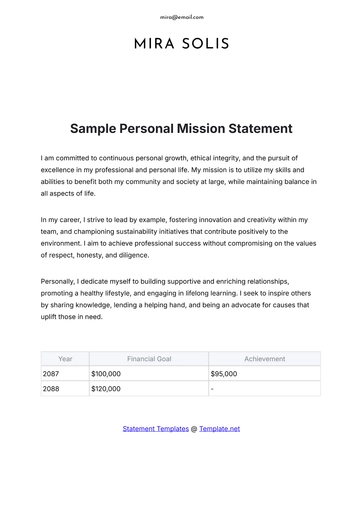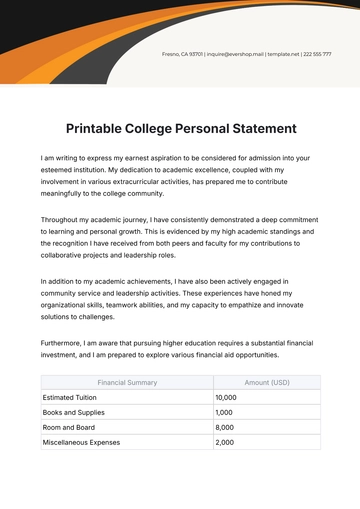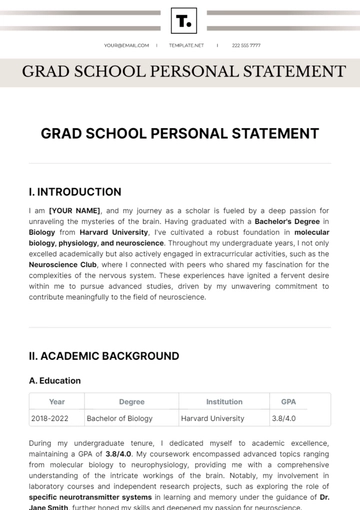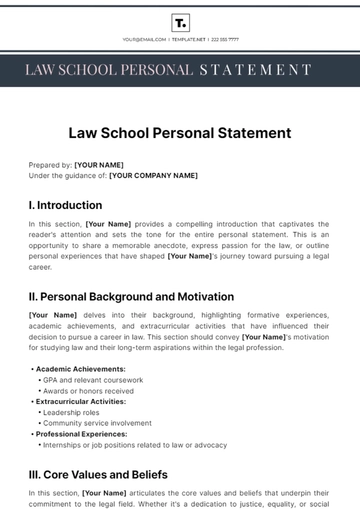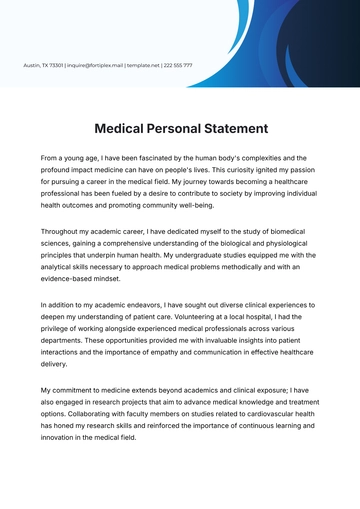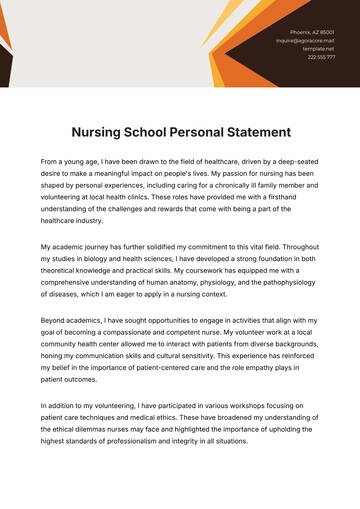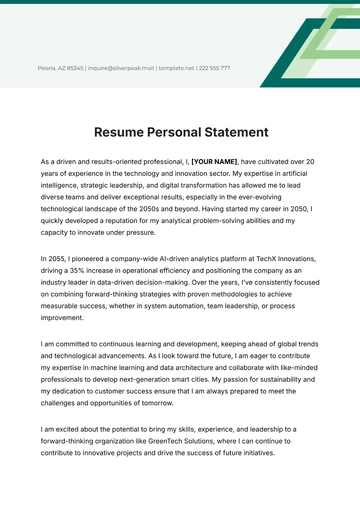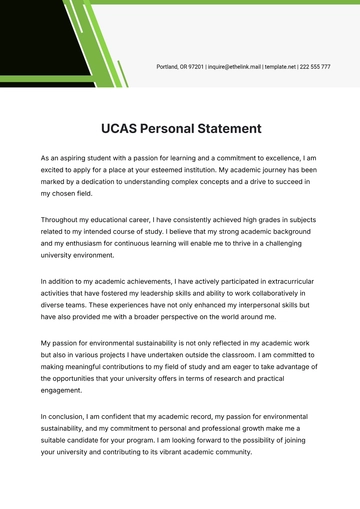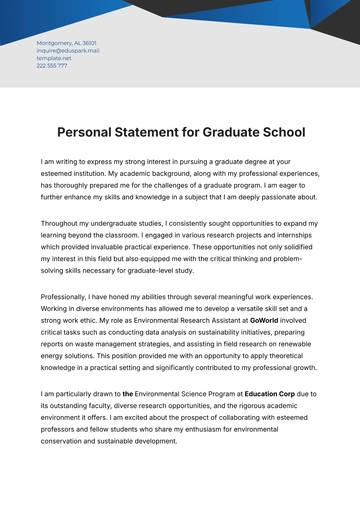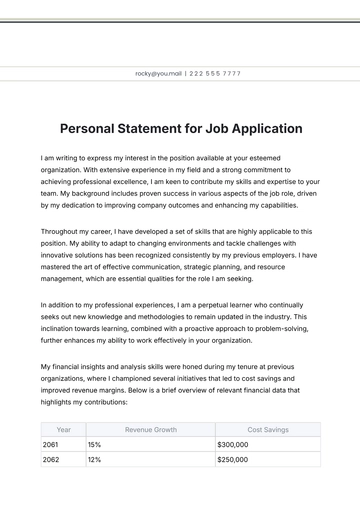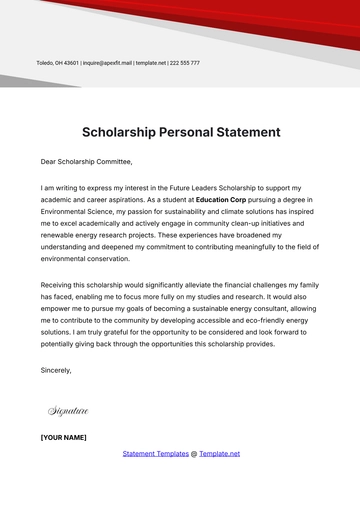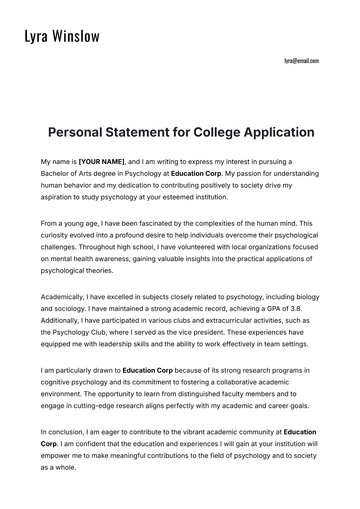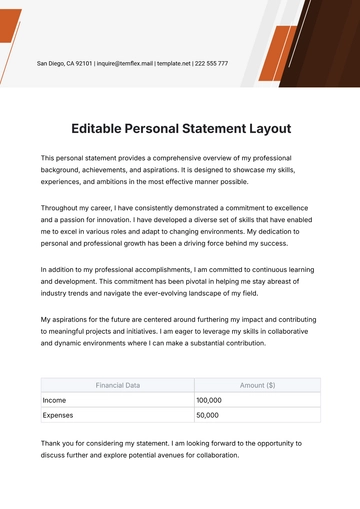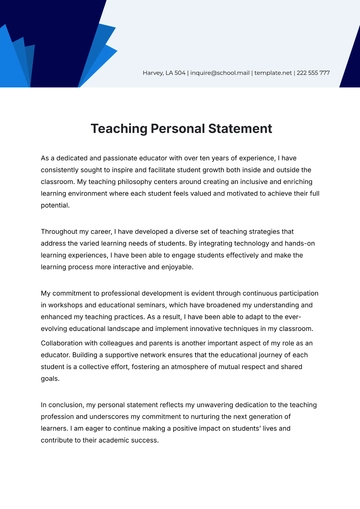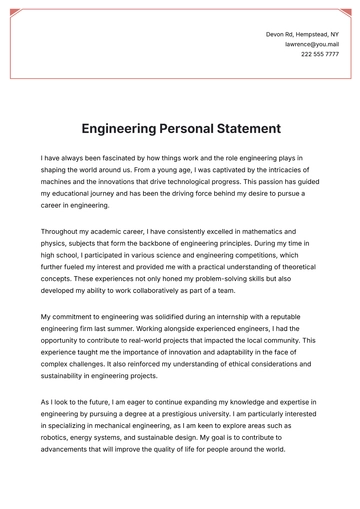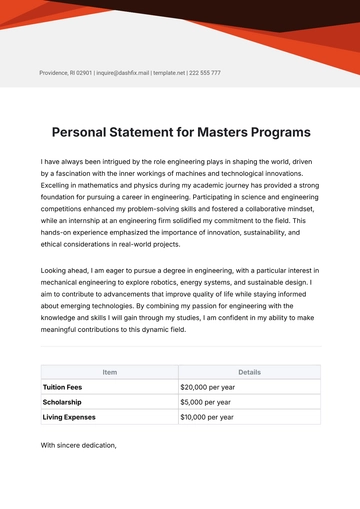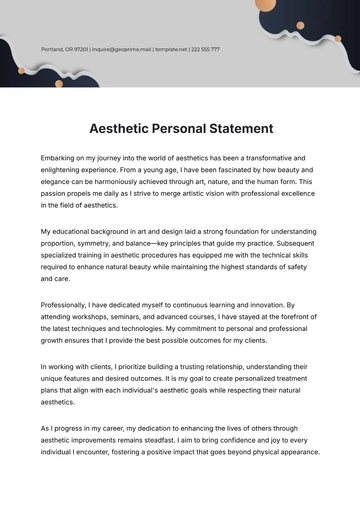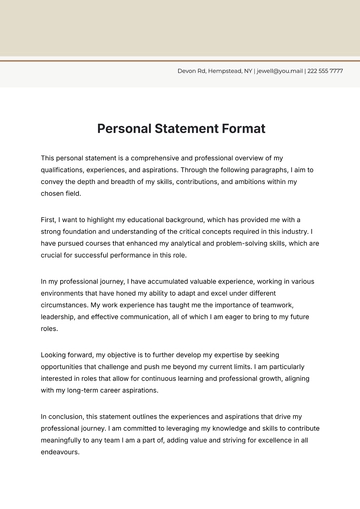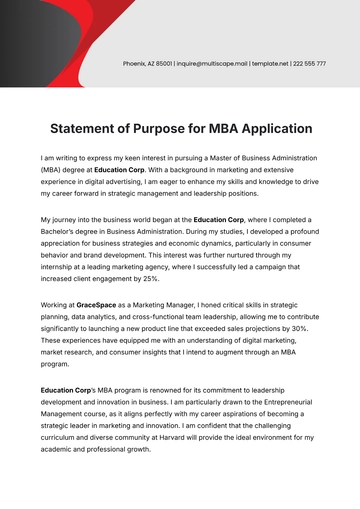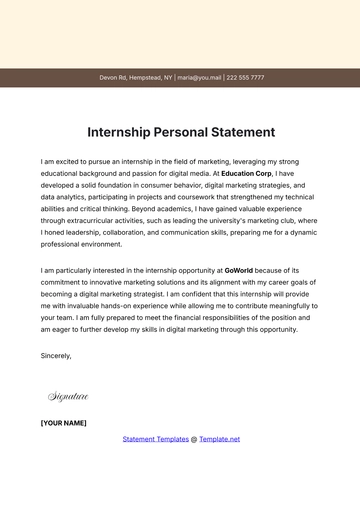Free Grad School Personal Statement
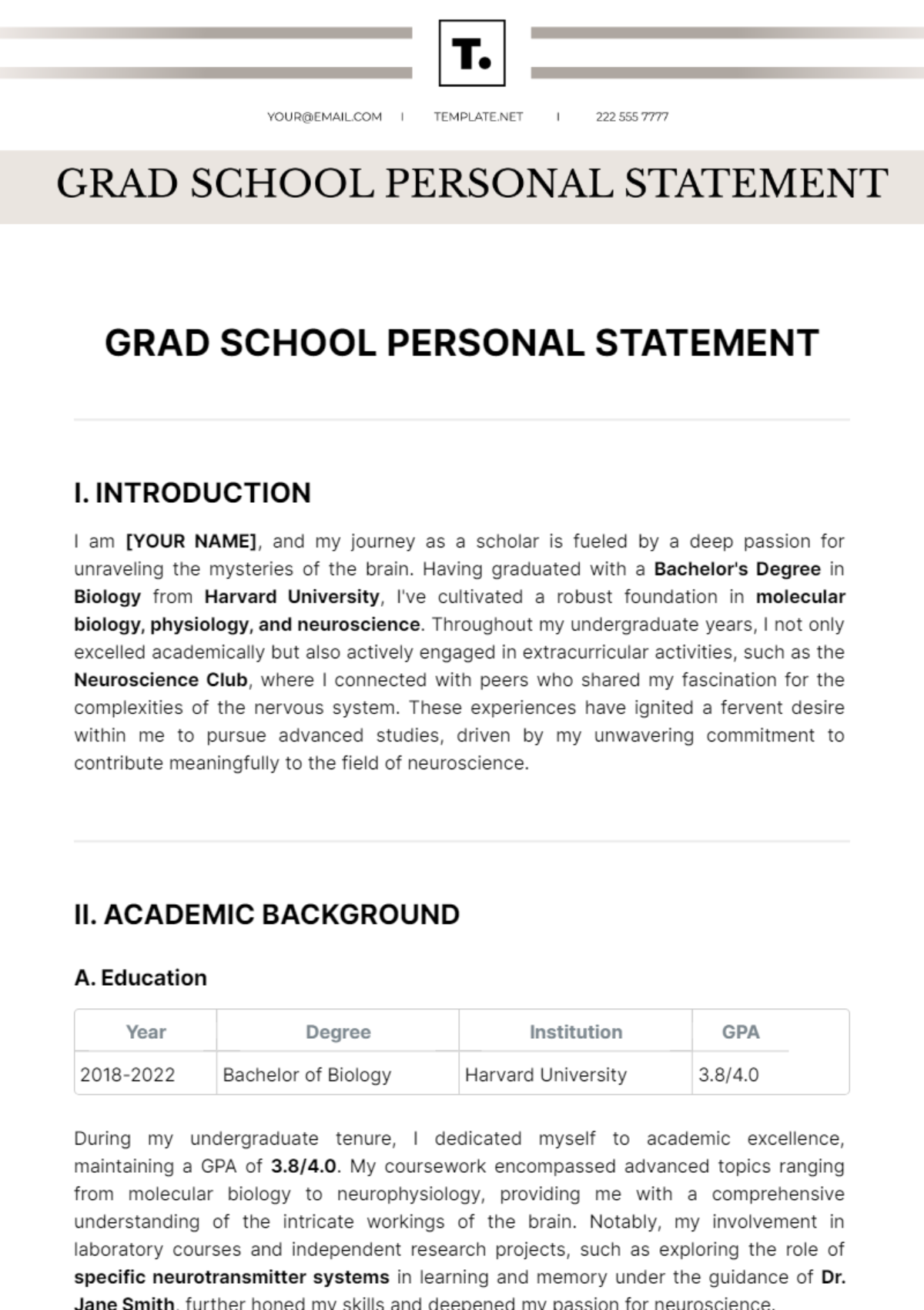
I. INTRODUCTION
I am [YOUR NAME], and my journey as a scholar is fueled by a deep passion for unraveling the mysteries of the brain. Having graduated with a Bachelor's Degree in Biology from Harvard University, I've cultivated a robust foundation in molecular biology, physiology, and neuroscience. Throughout my undergraduate years, I not only excelled academically but also actively engaged in extracurricular activities, such as the Neuroscience Club, where I connected with peers who shared my fascination for the complexities of the nervous system. These experiences have ignited a fervent desire within me to pursue advanced studies, driven by my unwavering commitment to contribute meaningfully to the field of neuroscience.
II. ACADEMIC BACKGROUND
A. Education
Year | Degree | Institution | GPA |
|---|---|---|---|
2018-2022 | Bachelor of Biology | Harvard University | 3.8/4.0 |
During my undergraduate tenure, I dedicated myself to academic excellence, maintaining a GPA of 3.8/4.0. My coursework encompassed advanced topics ranging from molecular biology to neurophysiology, providing me with a comprehensive understanding of the intricate workings of the brain. Notably, my involvement in laboratory courses and independent research projects, such as exploring the role of specific neurotransmitter systems in learning and memory under the guidance of Dr. Jane Smith, further honed my skills and deepened my passion for neuroscience.
B. Research Experience
My journey as a researcher began as a Research Assistant in Dr. Jane Smith's lab, where I delved into the molecular mechanisms underlying synaptic plasticity. Through techniques such as immunohistochemistry and confocal microscopy, I contributed to unraveling the mysteries of long-term potentiation, a process crucial for learning and memory formation. These experiences have not only solidified my understanding of neuroscience but also instilled in me a profound appreciation for the power of research in driving scientific progress.
III. RESEARCH INTERESTS
My passion lies in understanding the molecular underpinnings of neuroplasticity and their implications in neurodegenerative diseases. I am particularly intrigued by the intricate signaling pathways governing synaptic connectivity and how their dysregulation contributes to conditions such as Alzheimer's disease. My previous research experiences have fueled my curiosity, propelling me to explore questions surrounding the mechanisms of protein aggregation and synaptic dysfunction in neurodegeneration.
IV. CAREER ASPIRATIONS
Here, I outline my short-term and long-term career goals, emphasizing my aspirations to contribute to scientific advancement in the field of neuroscience.
A. Short-Term Goals
In the immediate future, my goal is to pursue a Ph.D. in Neuroscience, where I aim to deepen my understanding of synaptic plasticity and neurodegeneration. Through rigorous research and interdisciplinary collaborations, I aspire to contribute novel insights to the field while honing my skills in experimental design and scientific communication.
B. Long-Term Goals
Looking ahead, I envision establishing my research laboratory dedicated to unraveling the mysteries of neurodegenerative diseases. By bridging the gap between basic science and clinical applications, I aspire to develop innovative therapeutic strategies that alleviate the burden of neurological disorders and improve the lives of affected individuals.
V. REASONS FOR PURSUING ADVANCED STUDIES
In this final section, I elucidate my motivations for choosing Harvard University for graduate studies and how the program aligns with my academic and career goals.
Harvard University represents the pinnacle of academic excellence in neuroscience, offering unparalleled opportunities for intellectual growth and scientific discovery. The renowned faculty members, such as Dr. Jane Smith and Dr. Michael Johnson, are at the forefront of groundbreaking research, providing an ideal environment for pursuing my interests in synaptic plasticity and neurodegeneration. Moreover, the collaborative and interdisciplinary nature of the program resonates with my vision of contributing to transformative advancements in neuroscience.
VI. CONCLUSION
In this concluding section, I reflect on my journey thus far and express my excitement for the opportunities that lie ahead in pursuing graduate studies in neuroscience.
As I look back on my academic journey, I am filled with gratitude for the opportunities that have shaped my passion for neuroscience. From my undergraduate studies at Harvard University to my research experiences in Dr. Jane Smith's lab, each step has deepened my understanding of the brain and fueled my desire to make meaningful contributions to the field. Now, as I embark on the next chapter of my academic career, I am eager to expand my horizons and delve into the complexities of synaptic plasticity and neurodegeneration through graduate studies at Harvard University.
The prospect of collaborating with esteemed faculty members and engaging in cutting-edge research initiatives fills me with excitement and anticipation. I am confident that the interdisciplinary environment and resources available at Harvard will provide the ideal platform for me to pursue my research interests and contribute to the advancement of neuroscience. With determination, curiosity, and a steadfast commitment to excellence, I am ready to embark on this transformative journey and unlock new insights into the mysteries of the brain.
As I take this leap forward, I am grateful for the support of my mentors, peers, and family who have encouraged me to pursue my dreams. With their guidance and encouragement, I am confident that I will emerge from this journey as a knowledgeable and impactful researcher, dedicated to unraveling the complexities of the nervous system and improving the lives of individuals affected by neurological disorders.
- 100% Customizable, free editor
- Access 1 Million+ Templates, photo’s & graphics
- Download or share as a template
- Click and replace photos, graphics, text, backgrounds
- Resize, crop, AI write & more
- Access advanced editor
Enhance and Discover Template.net's Grad School Personal Statement Template! Craft compelling narratives effortlessly with our editable and customizable template. Tailor your story seamlessly with our AI Editor Tool, ensuring every word reflects your unique journey and aspirations. Elevate your application with precision and flair. Your future awaits—start crafting it today.

